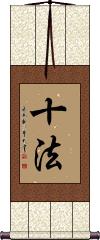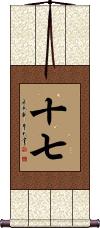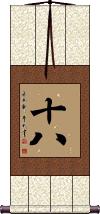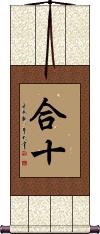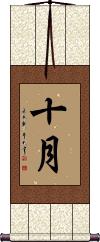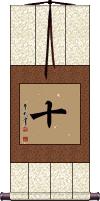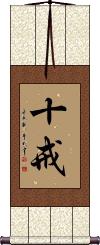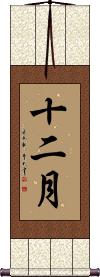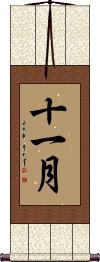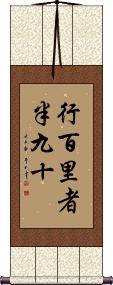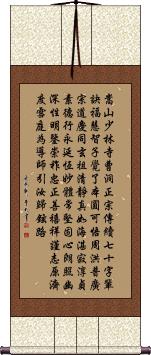Many custom options...
And formats...

十 in Chinese / Japanese...
Buy an 十 calligraphy wall scroll here!
Personalize your custom “十” project by clicking the button next to your favorite “十” title below...
2. 17 Seventeen
5. October
6. Ten
8. December
9. November
11. Benedict
12. The one who retreats 50 paces mocks the one to retreats 100
13. Walking 100 Miles: Stopping at 90 miles, is the same as stopping half-way
Ten perfect Mahayana rules
十法 is the title of the ten perfect or perfecting Mahāyāna rules.
The order of rules is as follows:
1. right belief.
2. right conduct.
3. right spirit.
4. the joy of the bodhi mind.
5. joy in the dharma.
6. joy in meditation.
7. pursuing the correct dharma.
8. obedience to, or accordance with dharma.
9. departing from pride, desire, etc.
10. comprehending the inner teaching of Buddha and taking no pleasure in attaining such knowledge or noting the ignorance of others.
This title is only used in the context of Buddhism. Japanese and Chinese people who are not familiar with Buddhism will not recognize this title.
17 Seventeen
Eighteen / 18
This means eighteen (18).
This can be pronounced seipai, toya, or jūhachi in Japanese. It can also be a Japanese personal name, Toya.
This would be the way to write the Buddhist Sanskrit word aṣṭādaśa (meaning 18) in Chinese, old Korean Hanja, and Japanese Kanji.
Namaste - Greeting
The word namaste comes from Sanskrit and is a common greeting in the Hindi and Nepali languages exchanged by devout Hindu or Buddhist people in Southern Asia (especially India).
合十 is the Chinese form (not well-known in Japan) of this word which is used to describe a Buddhist (or Hindu) greeting with palms closed together prayerfully, generally at chest level. However, this selection of characters describes the act and is not a word spoken during the greeting. Words or a greeting are seldom spoken when two Buddhists meet. The greeting is silent and respectful but composed completely of body language.
Note that the greeting namaste and the act of placing palms together are used both as a hello and goodbye (like the word aloha in Hawaiian).
If you are looking for a welcoming hello and goodbye, you may want to consider gassho or a simple welcome.
October
Tenth Month
十月 is how Chinese and Japanese express October (also used in old Korean Hanja).
十月 literally means “tenth month” or “tenth moon.”
Ten
The number ten
十 is the number ten in Chinese, Japanese Kanji, and old Korean Hanja.
This is a strange selection for a wall scroll, so it's here mostly for reference. I guess it's OK if the number ten is important to you.
![]() Because this character is rather simple (just two strokes), there is an anti-fraud way to write ten on bank documents. This variant is shown to the right.
Because this character is rather simple (just two strokes), there is an anti-fraud way to write ten on bank documents. This variant is shown to the right.
Ten Commandments
十戒 means Ten Commandments or Ten Precepts.
In the Buddhist context, these are prohibitions consisting of five commandments for the layman:
1. Not to destroy life 不殺生 Pāṇātipātāveramaṇi.
2. Not to steal 不倫盜 Adinnādānāver.
3. Not to commit adultery 不婬慾 Abrahmacaryaver.
4. Not to lie 不妄語 Musāvādāver.
5. Not to take intoxicating liquor 不飮酒 Suramereyya-Majjapamādaṭṭhānāver.
The ten commandments for the monk are the preceding five plus:
6. Not to eat food outside of regulated hours 不非時食 Vikāla-Bhojanāver.
7. Not to use garlands or perfumes 不著華鬘好香塗身 Mālā- Gandha-Vilepana-Dhāraṇa-Maṇḍana-Vibhūṣanaṭṭhānā.
8. Not to sleep on high or broad beds (chastity) 不坐高廣大牀 Uccāsayanā-Mahāsayanā.
9. Not to take part in singing, dancing, musical or theatrical performances 不歌舞倡伎不往觀聽 Nacca-Gīta-Vādita-Visūkadassanāver.
10. To refrain from acquiring uncoined or coined gold, or silver, or jewels 不得捉錢金銀寶物 Jātarūpa-Rajata-Paṭīggahaṇāver.
These original Buddhist commandments date back to about 2500 years ago. The English definitions above are followed by Chinese characters and original Pali pronunciation.
Under the Māhayāna Buddhism, these ten commands for the monk were changed, to accord with the new environment of the monk, to the following: not to kill, not to steal, to avoid all unchastity, not to lie, not to slander, not to insult, not to chatter, not to covet, not to give way to anger, to harbor no skepticism.
December
Twelfth Month
十二月 is December, the twelfth month of the year, in Chinese, Japanese Kanji, and old Korean Hanja.
November
Eleventh Month
十一月 is the Chinese, Japanese, and old Korean title for the month of November.
This literally means the eleventh month or moon.
The Eighteen Arhats
Benedict
The one who retreats 50 paces mocks the one to retreats 100
The pot calls the kettle black
五十步笑百步 is a Chinese proverb that means the one who retreats 50 paces mocks the one who retreats 100 paces.
During the Warring States Period of what is now China (475 - 221 B.C.), the King of Wei was in love with war. He often fought with other kingdoms just for spite or fun.
One day, the King of Wei asked the philosopher Mencius, “I love my people, and all say I do the best for them. I move the people from famine-stricken areas to places of plenty and transport grains from rich areas to the poor. Nobody goes hungry in my kingdom, and I treat my people far better than other kings. But why does the population of my kingdom not increase, and why does the population of other kingdoms not decrease?”
Mencius answered, “Since you love war, I will make this example: When going to war, and the drums beat to start the attack, some soldiers flee for their lives in fear. Some run 100 paces in retreat, and others run 50 steps. Then the ones who retreated 50 paces laugh and taunt those who retreated 100 paces, calling them cowards mortally afraid of death. Do you think this is reasonable?
The King of Wei answered, “Of course not! Those who run 50 paces are just as timid as those who run 100 paces.”
Mencius then said, “You are a king who treats his subjects better than other kings treat their people, but you are so fond of war that your people suffer from great losses in battle. Therefore, your population does not grow. While other kings allow their people to starve to death, you send your people to die in war. Is there any difference?”
This famous conversation led to the six-character proverb shown here. It serves as a warning to avoid hypocrisy. It goes hand-in-hand with the western phrase, “The pot calls the kettle black,” or the Biblical phrase, “Before trying to remove a splinter from your neighbor's eye, first remove the plank from your own eye.”
Walking 100 Miles: Stopping at 90 miles, is the same as stopping half-way
行百里者半九十 is an old Chinese proverb that speaks to the act of giving up. This phrase suggests that no matter how close you are to finishing your task or journey, giving up just before you finish is just as bad as giving up halfway.
50% finished or 90% finished, the result is the same: “You are not finished.”
You can take what you want from this proverb, but I think it suggests that you should finish what you start, and especially finish that last 10% of your journey or project so that you can honestly say “it's finished.”
Some notes: The character, 里, that I am translating as “mile” is an ancient “Chinese mile” which is actually about half a kilometer - it just doesn't sound right to say “When walking 100 half-kilometers...”
Wisdom from Hard Knocks
The school of hard knocks
挨一拳得一招挨十拳變諸葛 is a Chinese proverb that literally translates as: Receive one blow, [and one] learns a lesson; Receive ten blows, [and one] becomes a great Zhuge [Liang].
You must first understand that a man named Zhuge Liang was one of the great strategists and philosophers in Chinese history. He's known as a man of great wisdom.
Figuratively, this phrase means:
One can learn much from failure or “hard knocks.”
Shaolin Generational Poem
This is a poem, including a title, that celebrates the tactics and virtues of the Shaolin Kung Fu Monks for future generations.
Not the results for 十 that you were looking for?
Below are some entries from our dictionary that may match your 十 search...
| Characters If shown, 2nd row is Simp. Chinese |
Pronunciation Romanization |
Simple Dictionary Definition |
十七 see styles |
shí qī shi2 qi1 shih ch`i shih chi tona とな |
More info & calligraphy: 17 Seventeen17; seventeen; (surname) Tona |
十八 see styles |
shí bā shi2 ba1 shih pa toya とや |
More info & calligraphy: Eighteen / 1818; eighteen; (personal name) Toya aṣṭādaśa, eighteen. |
十戒 see styles |
shí jiè shi2 jie4 shih chieh jukkai じゅっかい |
More info & calligraphy: Ten Commandments(1) (Buddhist term) the 10 precepts; (2) Ten Commandments; Decalogue; Decalog; (surname) Jukkai Śikṣāpada. The ten prohibitions (in Pāli form) consist of five commandments for the layman: (1) not to destroy life 不殺生 pāṇātipātāveramaṇi; (2) not to steal 不倫盜 adinnādānāver; (3) not to commit adultery 不婬慾 abrahmacaryaver.; (4) not to lie 不妄語musāvādāver.; (5) not to take intoxicating liquor 不飮酒 suramereyya-majjapamādaṭṭhānāver. Eight special commandments for laymen consist of the preceding five plus: (6) not to eat food out of regulated hours 不非時食 vikāla-bhojanāver.; (7) not to use garlands or perfumes 不著華鬘好香塗身 mālā- gandha-vilepana-dhāraṇa-maṇḍana-vibhūṣanaṭṭhānā; (8) not to sleep on high or broad beds (chastity) 不坐高廣大牀 uccāsayanā-mahāsayanā. The ten commandments for the monk are the preceding eight plus: (9) not to take part in singing, dancing, musical or theatrical performances, not to see or listen to such 不歌舞倡伎不往觀聽 nacca-gīta-vādita-visūkadassanāver.; (10) to refrain from acquiring uncoined or coined gold, or silver, or jewels 不得捉錢金銀寶物 jātarūpa-rajata-paṭīggahaṇāver. Under the Māhayāna these ten commands for the monk were changed, to accord with the new environment of the monk, to the following: not to kill, not to steal, to avoid all unchastity, not to lie, not to slander, not to insult, not to chatter, not to covet, not to give way to anger, to harbour no scepticism. |
十月 see styles |
shí yuè shi2 yue4 shih yüeh totsuki とつき |
More info & calligraphy: October(adverbial noun) October; (female given name) Totsuki |
十法 see styles |
shí fǎ shi2 fa3 shih fa jippō |
More info & calligraphy: Ten perfect Mahayana rules |
合十 see styles |
hé shí he2 shi2 ho shih gōjū |
More info & calligraphy: Namaste - Greeting合爪; 合掌 To bring the ten fingers or two palms together; a monk's salutation. |
十一月 see styles |
shí yī yuè shi2 yi1 yue4 shih i yüeh juuichigatsu / juichigatsu じゅういちがつ |
More info & calligraphy: November(adverbial noun) November |
十二月 see styles |
shí èr yuè shi2 er4 yue4 shih erh yüeh kanna かんな |
More info & calligraphy: December(adverbial noun) December; (female given name) Kanna |
十八羅漢 十八罗汉 see styles |
shí bā luó hàn shi2 ba1 luo2 han4 shih pa lo han juuhachirakan / juhachirakan じゅうはちらかん |
More info & calligraphy: The Eighteen Arhatseighteen arhats |
五十步笑百步 see styles |
wǔ shí bù xiào bǎi bù wu3 shi2 bu4 xiao4 bai3 bu4 wu shih pu hsiao pai pu |
More info & calligraphy: The one who retreats 50 paces mocks the one to retreats 100 |
行百里者半九十 see styles |
xíng bǎi lǐ zhě bàn jiǔ shí xing2 bai3 li3 zhe3 ban4 jiu3 shi2 hsing pai li che pan chiu shih |
More info & calligraphy: Walking 100 Miles: Stopping at 90 miles, is the same as stopping half-way |
一十 see styles |
kazuto かずと |
(given name) Kazuto |
七十 see styles |
qī shí qi1 shi2 ch`i shih chi shih shichijuu / shichiju しちじゅう |
seventy; 70 seventy; (given name) Shichijuu saptati' seventy. |
万十 see styles |
manjuu / manju まんじゅう |
(surname) Manjuu |
三十 see styles |
sān shí san1 shi2 san shih mito みと |
thirty; 30 (out-dated or obsolete kana usage) (numeric) thirty; (numeric) thirty; (female given name) Mito thirty |
上十 see styles |
kamiji かみじっ |
(place-name) Kamiji |
中十 see styles |
nakajuu / nakaju なかじゅう |
(surname) Nakajuu |
丸十 see styles |
marujuu / maruju まるじゅう |
cross in a circle; (surname) Marujuu |
乙十 see styles |
ottoo おっとお |
(female given name) Ottoo |
九十 see styles |
jiǔ shí jiu3 shi2 chiu shih kuto くと |
ninety ninety; (surname) Kuto ninety |
二十 see styles |
èr shí er4 shi2 erh shih nijuu / niju にじゅう |
twenty; 20 (1) 20 years old; (2) (archaism) twenty; (out-dated or obsolete kana usage) twenty; twenty; (surname) Nijuu viṃśati. Twenty. |
五十 see styles |
wǔ shí wu3 shi2 wu shih goji ごじっ |
fifty fifty; (place-name) Goji fifty |
亥十 see styles |
ijuu / iju いじゅう |
(given name) Ijuu |
京十 see styles |
keito / keto けいと |
(female given name) Keito |
仁十 see styles |
nijuu / niju にじゅう |
(given name) Nijuu |
伊十 see styles |
ijuu / iju いじゅう |
(personal name) Ijuu |
佐十 see styles |
sajuu / saju さじゅう |
(personal name) Sajuu |
何十 see styles |
nanjuu / nanju なんじゅう |
(several) tens; dozens; scores (of) |
儀十 see styles |
gijuu / giju ぎじゅう |
(given name) Gijuu |
元十 see styles |
genjuu / genju げんじゅう |
(given name) Genjuu |
Click here for more 十 results from our dictionary
The following table may be helpful for those studying Chinese or Japanese...
| Title | Characters | Romaji (Romanized Japanese) | Various forms of Romanized Chinese | |
| Ten perfect Mahayana rules | 十法 | jippou / jipo | shí fǎ / shi2 fa3 / shi fa / shifa | shih fa / shihfa |
| 17 Seventeen | 十七 | juunana / juushichi junana / jushichi | shí qī / shi2 qi1 / shi qi / shiqi | shih ch`i / shihchi / shih chi |
| Eighteen 18 | 十八 | sei pai / to ya seipai / toya | shí bā / shi2 ba1 / shi ba / shiba | shih pa / shihpa |
| Namaste - Greeting | 合十 | gou juu / goujuu / go ju | hé shí / he2 shi2 / he shi / heshi | ho shih / hoshih |
| October | 十月 | juu gatsu / juugatsu / ju gatsu | shí yuè / shi2 yue4 / shi yue / shiyue | shih yüeh / shihyüeh |
| Ten | 十 / 拾 十 | juu / ju | shí / shi2 / shi | shih |
| Ten Commandments | 十戒 | jukkai / jukai | shí jiè / shi2 jie4 / shi jie / shijie | shih chieh / shihchieh |
| December | 十二月 | juu ni gatsu juunigatsu ju ni gatsu | shí èr yuè shi2 er4 yue4 shi er yue shieryue | shih erh yüeh shiherhyüeh |
| November | 十一月 | juu ichi gatsu juuichigatsu ju ichi gatsu | shí yī yuè shi2 yi1 yue4 shi yi yue shiyiyue | shih i yüeh shihiyüeh |
| The Eighteen Arhats | 十八羅漢 十八罗汉 | shí bā luó hàn shi2 ba1 luo2 han4 shi ba luo han shibaluohan | shih pa lo han shihpalohan |
|
| Benedict | 本篤十六世 本笃十六世 | běn dǔ shí liù shì ben3 du3 shi2 liu4 shi4 ben du shi liu shi bendushiliushi | pen tu shih liu shih pentushihliushih |
|
| The one who retreats 50 paces mocks the one to retreats 100 | 五十步笑百步 | wù shí bù xiào bǎi bù wu4 shi2 bu4 xiao4 bai3 bu4 wu shi bu xiao bai bu wushibuxiaobaibu | wu shih pu hsiao pai pu wushihpuhsiaopaipu |
|
| Walking 100 Miles: Stopping at 90 miles, is the same as stopping half-way | 行百里者半九十 | xíng bǎi lǐ zhě bàn jiǔ shí xing2 bai3 li3 zhe3 ban4 jiu3 shi2 xing bai li zhe ban jiu shi xingbailizhebanjiushi | hsing pai li che pan chiu shih hsingpailichepanchiushih |
|
| Wisdom from Hard Knocks | 挨一拳得一招挨十拳變諸葛 挨一拳得一招挨十拳变诸葛 | ái yī quán dé yī zhāo ái shí quán biàn zhū gě ai2 yi1 quan2 de2 yi1 zhao1 ai2 shi2 quan2 bian4 zhu1 ge3 ai yi quan de yi zhao ai shi quan bian zhu ge | ai i ch`üan te i chao ai shih ch`üan pien chu ko ai i chüan te i chao ai shih chüan pien chu ko |
|
| Shaolin Generational Poem | 嵩山少林寺曹洞正宗傳續七十字輩訣福慧智子覺了本圓可悟周洪普廣宗道慶同玄祖清靜真如海湛寂淳貞素德行永延恆妙體常堅固心朗照幽深性明鑒崇祚忠正善禧祥謹志原濟度雪庭為導師引汝歸鉉路 嵩山少林寺曹洞正宗传续七十字辈诀福慧智子觉了本圆可悟周洪普广宗道庆同玄祖清静真如海湛寂淳贞素德行永延恒妙体常坚固心朗照幽深性明鉴崇祚忠正善禧祥谨志原济度雪庭为导师引汝归铉路 | sōng shān shào lín sì cáo dòng zhèng zōng chuán xù qī shí zì bèi jué fú huì zhì zǐ jiào le běn yuán kě wù zhōu hóng pǔ guǎng zōng dào qìng tóng xuán zǔ qīng jìng zhēn rú hǎi zhàn jì chún zhēn sù dé xíng yong song1 shan1 shao4 lin2 si4 cao2 dong4 zheng4 zong1 chuan2 xu4 qi1 shi2 zi4 bei4 jue2 fu2 hui4 zhi4 zi3 jiao4 le5 ben3 yuan2 ke3 wu4 zhou1 hong2 pu3 guang3 zong1 dao4 qing4 tong2 xuan2 zu3 qing1 jing4 zhen1 ru2 hai3 zhan4 ji4 chun2 zhen1 su4 de2 xing2 yong song shan shao lin si cao dong zheng zong chuan xu qi shi zi bei jue fu hui zhi zi jiao le ben yuan ke wu zhou hong pu guang zong dao qing tong xuan zu qing jing zhen ru hai zhan ji chun zhen su de xing yong | sung shan shao lin ssu ts`ao tung cheng tsung ch`uan hsü ch`i shih tzu pei chüeh fu hui chih tzu chiao le pen yüan k`o wu chou hung p`u kuang tsung tao ch`ing t`ung hsüan tsu ch`ing ching chen ju hai chan chi ch`un chen su te hsing yung sung shan shao lin ssu tsao tung cheng tsung chuan hsü chi shih tzu pei chüeh fu hui chih tzu chiao le pen yüan ko wu chou hung pu kuang tsung tao ching tung hsüan tsu ching ching chen ju hai chan chi chun chen su te hsing yung |
|
| In some entries above you will see that characters have different versions above and below a line. In these cases, the characters above the line are Traditional Chinese, while the ones below are Simplified Chinese. | ||||
Successful Chinese Character and Japanese Kanji calligraphy searches within the last few hours...
